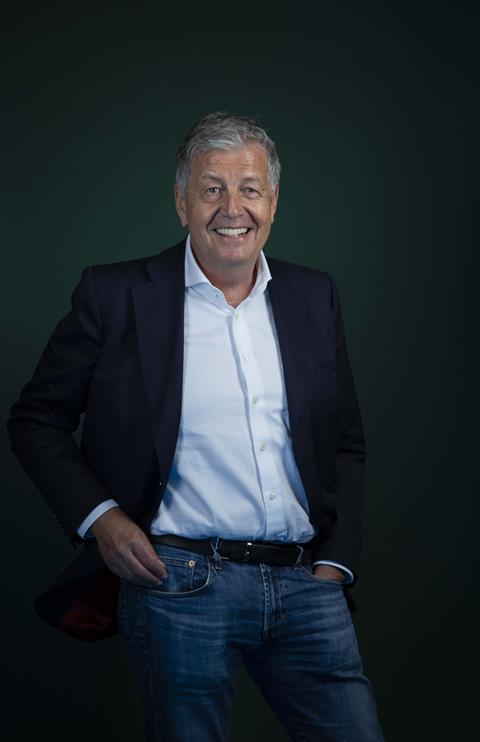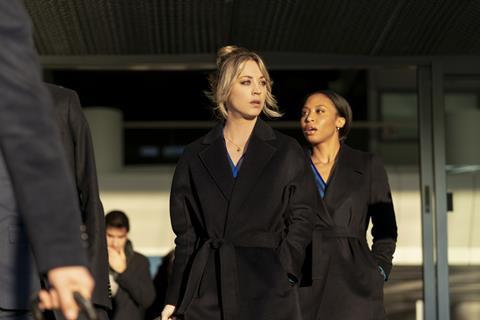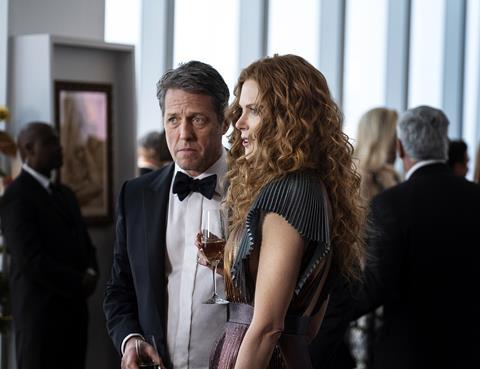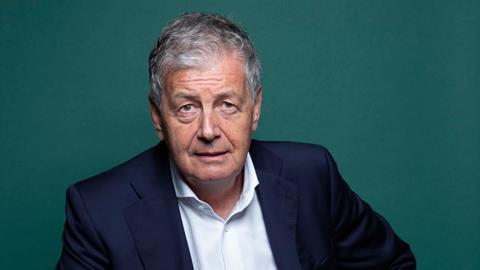The Warner Media International chief on the importance of local content, why it’s good to fail and the prospect of breaking HBO Max’s ties with Sky
Gerhard Zeiler is relaxed. After 18 months of video conferencing and few in-person meetings, he is enjoying having a Dictaphone pointed in his direction as Broadcast fires off questions about Warner Media’s international operations, Channel 4 privatisation and the role of PSBs and regulators.
This is his first media interview since the Covid-19 pandemic struck, but also the first since he was made president of Warner Media International in August 2020, a wide-ranging position in which he manages the US media giant’s global operations. This gives him oversight of Warner Bros, HBO and Turner Networks, regional programming for HBO Max and global production unit Warner Bros International Television Production (WBITVP).
To illustrate the breadth of his responsibilities, Zeiler oversees 270 linear channels and more than 70 brands. It is a mammoth job, made more complicated by the fact he has been restricted in meeting his global teams in person because of the pandemic. That means he, and Warner Media in general, has had to learn to be “very disciplined in communication” between colleagues in the virtual environment.

“The biggest tool you have in a company is communication: talking and listening to people,” he says. “One thing I miss, which you can’t compensate for on a Zoom call, is standing in front of 100 people talking and listening to them, seeing their faces and seeing their eyes.”
He is speaking from Warner Media’s shiny new London office in Old Street, which has kept its new-build feel over the past 17 months chiefly because it has been empty but for five weeks before the pandemic struck.
The office has been set up for colleague intermingling and collaboration, with the focal point a central staircase a central staircase that links the floors and helps teams “feel connected, easing collaboration across different parts of the business”, according to its designers.
For now, the building stands eerily silent, with untouched computers, chairs neatly stacked on desks and the central staircase deserted. It is the physical antithesis of Zeiler’s intent to create “one team” globally, building a diverse and collaborative central Warner Media culture.
“If you believe the success in being global means everything should be decided in the US, I strongly disagree,” he says. “You need a global culture and a super-local approach. I believe everybody has a right to be listened to and to be heard. Listening to people is so important at a time when there is so much change in the air.”
Zeiler is about to embark on visits to six locations across EMEA to meet several of his teams. The tour coincides with recent news that Warner Media’s flagship international product – streamer HBO Max – is continuing its rollout, with its first six European territories (Sweden, Denmark, Norway, Finland, Spain and Andorra) confirmed for launch this month.
HBO Max’s expansion is Zeiler’s principal priority, and the vehicle through which he expects to achieve the global Warner Media culture. He says the “super-local global approach” is paralleled in HBO Max’s content plans.
“Yes, it’s important to have your Harry Potters and Game Of Thrones because they will be watched in every single country of the world, but it’s as important to have local content,” he says. “People in Japan are different from people in Brazil, are different from people in Italy. My job is to be an advocate for these differences in international markets.”
Zeiler sees an uncertain future for global media and so wants to foster a “culture of risk-taking”, believing that “making mistakes helps progress – fail often, fail fast and fail cheaply”.
He is quick to stress that local HBO Max originals are unlikely to be given the multimillion-pound budgets that the final few series of Game Of Thrones received, namely because anyone pitching a German, Japanese, Korean or Brazilian GoT would throw up “a lot of question marks” in his mind.
“You can’t plan global hits – or at least, I don’t know anybody who can plan them,” he says. “What you can do is plan local and regional shows and budget them accordingly. It’s only rarely you have an international production where the creative believes it could be very big.”
This attitude fits with the mantra of “fail cheaply”, but doesn’t Zeiler think the cut-throat and hypercompetitive SVoD world demands instant success from originals? “No, I wouldn’t agree,” he counters.
“Certainly, because there’s a huge number of new shows, you must cut through the noise, but we have seen with several HBO Max shows like The Undoing and The Flight Attendant that you can grow audiences week by week. I don’t agree that your first episode has to be the biggest audience.”
In terms of attracting big audiences, the UK presents a tantalising prospect for the SVoD strategy, and a question on the lips of many industry observers is the shape of Warner Media’s approach, given that HBO’s content is tied up with Sky until 2025.
“We have a global ambition for HBO Max, and the UK should be part of that”
Zeiler attempts to deflect, pointing to HBO Max launches around Europe in 2022, before adding: “We have a long-running deal with Sky and there’s nothing more to say about that now. But I want to answer your questions with another: do you believe you can call yourself a global service without being in the UK?
“So yes, we have a global ambition, and one of the biggest and most important countries in the world should be part of that.”
The implication is that the deal throws doubt over a continuation of Warner Media’s output deal with Sky.

Outgoing chief exec Jason Kilar has acknowledged that the Sky tie-up has put the brakes on HBO Max’s rollout and the implication seems to be that the deal will not be renewed, or at the very least will be significantly recast, when it expires. Zeiler is clear that nothing is changing in the short term.
“Sky is a good partner, we have a contract, and we don’t breach contracts,” he says. “As long as both sides want to keep this contract, the contract will be in place. If the relationship one day comes to a point where the two sides [say] ‘we want to change this relationship’, we will tell you. But that’s not happening now.”
The situation isn’t unique to the UK and Warner Media has similar ongoing arrangements with Bell Media in Canada and Foxtel in Australia. However, Zeiler says the “transformational shift” towards direct-to-consumer is still in its infancy and the “wholesale relationships” between legacy media firms, including linear content deals and carriage relationships, are set to continue for “a long period of time”.
“Linear channels still have value for the customers, and they have value for us financially – in both windowing and licensing content, but also marketing,” he notes.

Zeiler knows a thing or two about linear networks, having been chief executive of European broadcast giant RTL Group between 2003 and 2012, before joining Warner Media subsidiary Turner. He expects more consolidation to occur among local media firms to form “national champions” that have the strength to compete with the SVoD giants.
Zeiler will not be drawn on the unexpected merger of Warner and Discovery, which emerged earlier this year, and says he is “100% focused on Warner Media” until the deal closes. “Thank God that not everybody will know my thoughts,” he jokes.
Zeiler himself has overseen some major M&A – selling Channel 5 to Richard Desmond’s Northern & Shell in 2010 for £103.5m. The broadcaster was subsequently sold by Desmond for more than four times that amount (£450m) to current owner ViacomCBS and the whole affair remains a sore point for Zeiler, who calls it “one of my biggest wounds”.
“I didn’t want to sell Channel 5 – my shareholders wanted me to sell it,” says the Anglophile exec ruefully. “I was sure that if we had waited a few years, we would have had the chance to either sell it for a higher price or consolidate it. Many years ago, we were the first try to consolidate Channel 4 and Channel 5. I can’t remember when exactly, but C4 was not interested in that at the time.”
Bidding for C4
It is why Zeiler remains an interested observer in potential privatisation hanging over C4, with another layer of intrigue being the suggestion that Discovery is a potential bidder for the PSB. “The UK landscape will change in one way or another,” he says.
“Regardless of whether you privatise C4 or not, the idea that a network can survive without being able to own IP is not the best, so there must be change”
Pushed on the topic, he adds: “This is difficult for me – for once in my life, I want to be diplomatic. Regardless of whether you privatise C4 or not, the idea that a network can survive without being able to own IP is not the best, so there must be change. Allowing C4 to have a future in owning certain IP is what I would argue for.”
Zeiler is a supporter of the PSB concept but believes the terms of such remits can be hard to follow and can go against consumer wants. “It needs to be a little bit more flexible, and not be dictated by rules that say, ‘you have to do 30 minutes of that type of programming and 30 minutes of that type’,” he says.
Zeiler’s relationship with laws and governance date back to the mid-1980s, when he served as a spokesperson for two Austrian chancellors. Knowing how much power media companies can wield, he believes one of the most important organisations in a country is a strong regulator – pertinent as Ofcom faces some of its biggest challenges in C4’s future, the PSB prominence debate and questions around plurality.
“As long as the competition law that exists is executed well, I don’t fear any development,” he says. “The only worry I have is the concept of the ‘winner takes it all’ and having one dominant company. This is something regulators and governments should avoid.”
PRODUCTION PHILOSOPHY
Much has been said about US media giants building international SVoD businesses – warehousing original programming, minimising licensing and directing in-house production units and labels to create programming for their own platforms. While Zeiler “strongly” believes investing in owned IP is “incredibly important”, in Warner Media’s case, this should not happen at the expense of its wider production businesses.
These include an international kids’ production unit and a local feature films business. There is also Casey Bloys’ in-house production unit, which feeds HBO Max; Warner Bros Television Studios, comprising the US arm led by ex-Netflix exec Channing Dungey; and internationally focused WBITVP, marshalled by former Endemol exec Ronald Goes.
Zeiler is committed to keeping the latter free from in-house constraints. He says WBITVP produced 3,000 hours of programming for more than 60 networks globally in 2019, and namechecks UK labels Wall to Wall, Twenty Twenty, Ricochet and Renegade.
“These are signs of the creative sources and talents we have,” he says. “We are on both sides of the aisle for production – we can produce in-house, but we also want to produce for others.”

































No comments yet